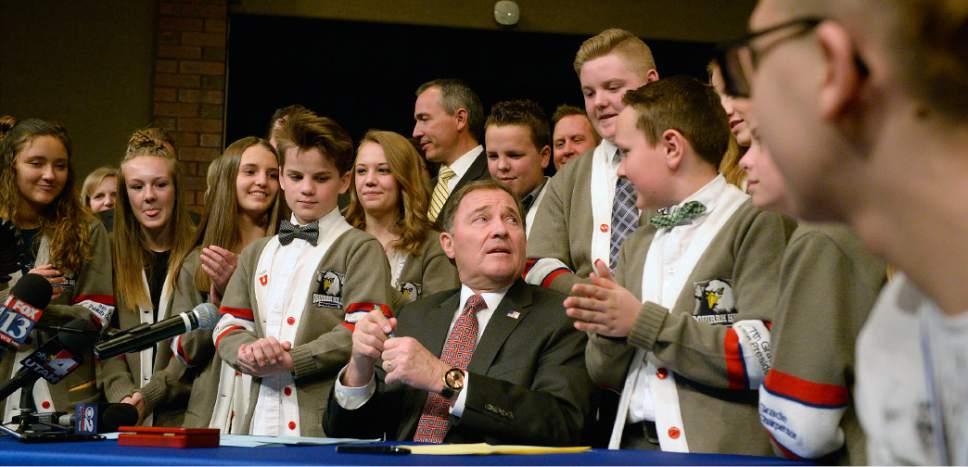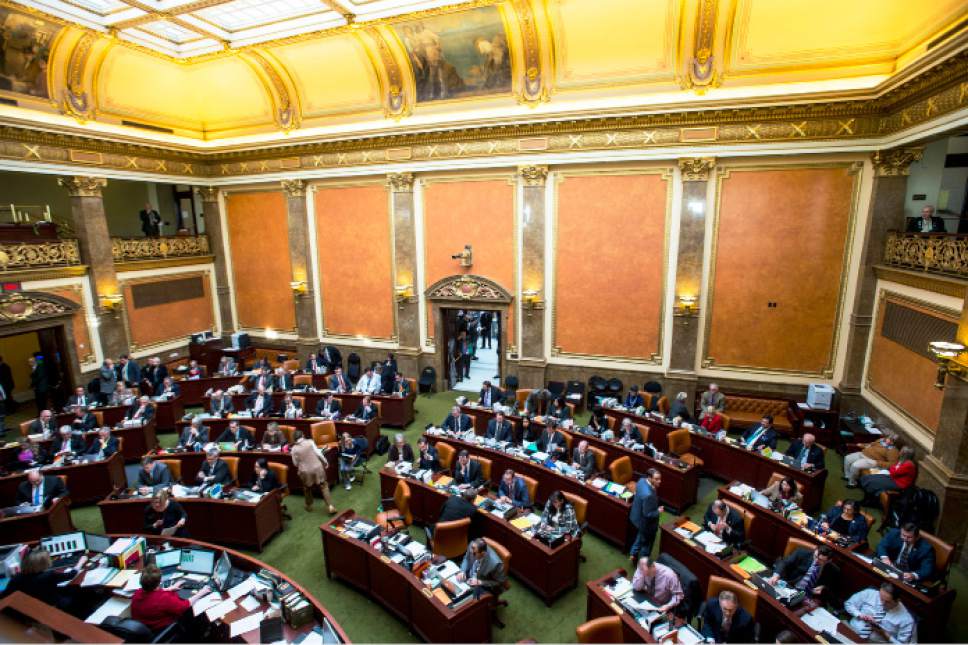This is an archived article that was published on sltrib.com in 2017, and information in the article may be outdated. It is provided only for personal research purposes and may not be reprinted.
Gov. Gary Herbert is now enjoying sky-high approval ratings — but the only groups of Utahns who applaud the Legislature's performance highly are Republicans and "very active" Mormons.
A new poll by The Salt Lake Tribune and the Hinckley Institute of Politics shows that Herbert's performance is strongly or somewhat approved by 71 percent of Utahns, while 26 percent somewhat or strongly disapprove, with 3 percent undecided.
That is up significantly from 15 months ago. A similar poll in January 2016 showed a 55-27 positive margin for Herbert, with 18 percent then undecided.
Republicans approved of the Legislature's performance 65 percent to 34 percent. Just 15 percent of Democrats and 35 percent of independent voters gave the Legislature high marks.
Only one of the religious categories in the poll — very active Mormons — gave the Legislature an overall positive rating, by a 63-36 margin. All others — Catholics, Protestants, "somewhat active" and "not active" Mormons and others — gave the Legislature a thumbs down by three-to-one margins or more.
House Speaker Greg Hughes, R-Draper, says that may show disdain for the Legislature's passage of a HB155 to make Utah's drunken driving laws the toughest in the nation, and publicity about other alcohol reform passed this year.
"People who drink responsibly, and it doesn't contradict their religion" likely "looked at the legislation and thought there was a lack of perception of reality," Hughes said. He has spoken out against the new law to lower the blood-alcohol content to be considered drunk while driving from 0.08 to 0.05.
About 60 percent of Utahns are LDS, while 88 percent of legislators are.
Hughes has praised Herbert's call for study this summer about possible unintended consequences of that new law, to be followed by a special session of the Legislature to fix problems well in advance of its Dec. 30, 2018, effective date.
Hughes noted that the poll had finished its surveying before Herbert signed HB155 on March 23 — and he wonders if the governor's numbers might actually be lower now because of his support of it. The statewide poll of 605 registered Utah voters was conducted March 15-21 by Dan Jones & Associates, and has a margin of error of 3.98 percent.
As reported earlier, that same poll also found that the only religious category that gave majority support for the new DUI bill was "very active" Mormons.
Herbert said he is thrilled with his high numbers, but said they mostly reflect that the state is doing well.
"I think it is indicative of the fact that the state continues to have great success economically," with a strong quality of life, he said.
"People are satisfied and feel good about the future of Utah and the progress we've made, and are optimistic that we are going to continue to excel," he said. "I'm just a reflection of that. The governor must be doing a good job because the state is doing a good job."
Herbert said he's especially humbled by his high numbers because "in politics, friends come and go — but enemies accumulate."
He has also praised the Legislature for working toward consensus on tough issues. "Sixty-three percent of the bills passed in the Legislature passed unanimously," he said. "Eighty-eight percent of the bills passed with over 85 percent of the vote… It shows an overwhelming consensus being developed in our Legislature."
Republicans maintain supermajorities in both chambers — controlling the House 62-13 and the Senate 24-5.
Senate President Wayne Niederhauser, R-Sandy, said he expects legislatures always have lower favorability ratings than governors.
"The Legislature has to address any issue that's brought before it," and can't choose just the popular ones. "In one way or another, we're affecting somebody out there negatively in all those bills."
The governor, meanwhile, "is a committee of one. Yes, he has to address the issues we send him. But he's not the one debating like we are at the Legislature," Niederhauser said.





